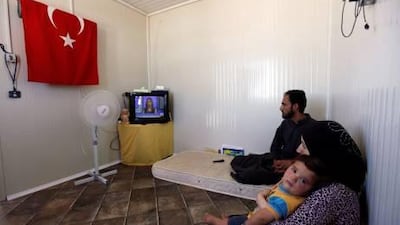ISTANBUL // The Syrian army is haemorrhaging troops at an increasing rate, eroding an institution vital to president Bashar Al Assad's hold on power.
Defections from the Syrian military are becoming more numerous and organised, with many defectors fleeing to Turkey together with their families, a Turkish government official said yesterday.
About 85 Syrian soldiers, including a general, had sought refuge in Turkey on Monday with a total of 208 family members, said the official, making it the biggest group of soldiers to defect to Turkey since the uprising against the Syrian regime began in March 2011.
According to an estimate by Turkish government officials, about 60,000 members of the Syrian security forces have defected so far, and several hundred have come to Turkey.
Fevzi Zakiroglu, a spokesman for the Syrian National Council (SNC), said the defections were a sign the Al Assad regime was "dissolving", but a Turkish analyst cautioned that defections, while on the rise, had yet to constitute a mortal threat to the Syrian president's rule.
Tensions on the Turkish-Syrian border remained high as Turkey scrambled fighter jets for the second time in days after Syrian helicopters approached the border region from within Syria. Last week, in a response to the downing of a Turkish military jet, Turkey declared that Syrian forces approaching the border would be seen as a threat.
Mr Al Assad used an interview with the Turkish Cumhuriyet daily yesterday to express regret the jet incident. "I wish we had not shot it down," he said, adding he was ready to issue a formal apology if it turned out that the jet was shot down in international airspace, as Turkey insists.
The Syrian president also criticised Ankara proclamation that it would engage Syrian forces approaching the border.
"An action undertaken against us on our soil will be understood as an attack on Syria," he said. "I absolutely do not wish to get to that point."
Ahmet Davutoglu, Turkey's foreign minister, was quoted by Turkish media as saying yesterday the downing of the jet by Syria had been a "crime that will not go unpunished". He added any attack against Turkey was an attack against Nato, the strongest defence bloc in the world.
Ankara has turned from Mr Al Assad's ally to critic after failing to convince the Syrian leader to implement political reforms. The Syrian leader's response to the uprising has led to the deaths of an estimated 20,000 people, according to the opposition.
Mr Al Assad claims the revolt is the work of "terrorists" with the support of several other countries.
Turkey has allowed Syrian defectors to establish the Free Syrian Army (FSA), a rebel force fighting Mr Assad's forces, on Turkish soil.
Many defectors are housed in Apaydin, a heavily guarded refugee camp in the Turkish province of Hatay that is closed to the media. News reports said yesterday that Turkish border troops taken the 85 defectors to Apaydin on Monday, while their family members were sent to other camps that house an 35,000 Syrian refugees in Turkey.
"They all arrived as a group," said the official. "It seems they had organised the trek in advance."
Mr Zakiroglu said the Syrian opposition in Turkey said defectors were taking their relatives with them to avoid reprisals by Syrian government forces.
He added that the opposition was receiving messages from high-level government officials in Syria who were contemplating defection. "Only yesterday, I had a message from a very senior figure in the regime who asked us: 'Where should I go with my family?'" Mr Zakiroglu did not give further details.
Sinan Ulgen, the chairman of the Centre for Economy and Foreign Policy Research (Edam), a think-tank in Istanbul, said although defections were not isolated cases, they were still below a level that would worry Mr Al Assad.
"It has not gone beyond a trickle yet, there are no mass defections that would have an impact on the military balance on the ground," Mr Ulgen said yesterday.
Referring to the structure of the Syrian armed forces, where key positions are held by loyal supporters of Mr Al Assad, including the president's brother Maher and other members of the ruling Alawite elite, Mr Ulgen said loyalties at the top of the regime would be "difficult to unravel" by the government's foes.
"The regime has proven to be much more resilient than initially estimated," Mr Ulgen said.
tseibert@thenational.ae

